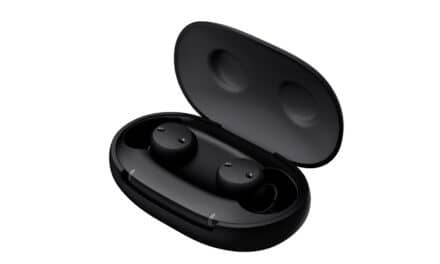A new survey conducted by The Harris Poll on behalf of Lexie Hearing finds 64% of older adults, aged 50 and older, report hearing difficulty, but only 14% have tried hearing aids and nearly a quarter have never had a formal hearing test.
The online survey measured hearing care attitudes and behaviors of more than 1,000 adults aged 50 and older in the U.S. nearly a year after over-the-counter (OTC) hearing aids were made available by the FDA.
Those who report having hearing difficulties cite a range of negative impacts on their overall and mental health, relationships, and day-to-day lives. Specifically:
- 55% say it negatively affects their ability to enjoy entertainment;
- 42% say it negatively affects their social life;
- 40% say it negatively affects their personal relationships;
- 32% say that it negatively affects their mental health; and
- 31% say it negatively affects their ability to conduct day-to-day activities.
Just under half of those who have experienced hearing difficulty (46%) say that other people don’t understand how much hearing loss has impacted their lives.
“Education continues to be a major barrier in improving widespread hearing health,” says De Wet Swanepoel, professor of audiology and editor-in-chief of the International Journal of Audiology. “Both clinical and non-clinical data show that hearing loss has a significant negative effect on people’s lives, and yet more than half dismiss it as an inevitable part of getting older, resulting in an average of seven years between first experiencing hearing loss to purchasing a hearing aid.”
Despite growing efforts from hearing health advocates to raise consumer awareness about hearing health, a quarter of Americans aged 50 and older don’t recognize that hearing loss can impact one’s overall health and only 38% say they are worried about hearing loss as they age. Rather, these respondents say they are more concerned about other signs of aging, such as eyesight decline (59%), diagnosis with serious health conditions (53%), cognitive health decline (48%); loss of balance (i.e., falling) (48%), and weight gain (40%).
OTC Hearing Aids
The introduction of OTC hearing aids to the market last year made high-quality, FDA-cleared hearing aids accessible for the 44 million Americans living with untreated hearing loss, yet many people say they still depend on their doctors to initiate conversations about hearing. The study found that 27% of people who report having difficulty hearing have refrained from getting a hearing aid because their doctor hasn’t told them they need them, even though hearing aids no longer require a prescription.
“Until last year, people had to go through a hearing health provider for hearing care,” says Nic Klopper, CEO of Lexie Hearing. “But now, innovation in hearing aids puts the control in the hands of all Americans who experience mild to moderate hearing loss. Today, people can walk into one of 14,000 stores nationwide and for under a $1,000 get back to better hearing the same day.”
Further reading: Hearing Aids May Slow Risk of Cognitive Decline in Older Adults
While hearing aids are more available and affordable than ever, consumers still have misperceptions about costs, effectiveness and availability, according to survey results. For example:
- 28% of U.S. adults aged 50 and older say they are not planning to purchase OTC hearing aids because they don’t trust the quality despite a growing body of clinical evidence to the contrary.
- More than half (51%) falsely believe or are not sure if a prescription is required to purchase hearing aids, even though OTC hearing aids have been available at retail and pharmacy stores across the U.S. for a full year.
- Among those diagnosed with hearing loss, 33% say they don’t have hearing aids because they are too expensive, perhaps not realizing that FDA-cleared OTC hearing aids are less than a quarter the cost of prescription devices. And increasingly, health plans, including Medicare Advantage, are adding hearing aid coverage benefits.
“As OTC hearing aids become more prevalent, we’re encouraged by the growing consumer interest in hearing care and the industry’s continued commitment to education, access and affordability,” says Klopper.
Survey Methodology
The research was conducted online in the United States by The Harris Poll on behalf of Lexie Hearing among 1,012 U.S. adults aged 50 and older. The survey was conducted from Sept. 19-25, 2023.
Data are weighted where necessary by age by gender, race/ethnicity, region, education, marital status, household size, household income and propensity to be online to bring them in line with their actual proportions in the population.
Respondents for this survey were selected from among those who have agreed to participate in our surveys. The sampling precision of Harris online polls is measured by using a Bayesian credible interval. For this study, the sample data is accurate to within 4.2 percentage points using a 95% confidence level. This credible interval will be wider among subsets of the surveyed population of interest.
All sample surveys and polls, whether or not they use probability sampling, are subject to other multiple sources of error which are most often not possible to quantify or estimate, including, but not limited to coverage error, error associated with nonresponse, error associated with question wording and response options, and post-survey weighting and adjustments.
Featured image: Lexie hearing aids are available over the counter at 14,000 stores nationwide. Photo: Lexie Hearing





